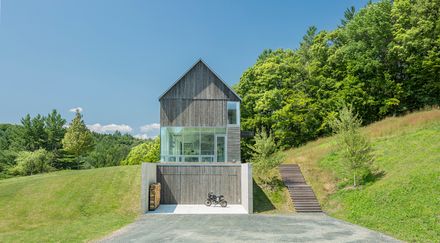
Bank Barn
ARCHITECTS
Birdseye
LANDSCAPE ARCHITECT
Wagner Hodgson Landscape Architecture
LEAD ARCHITECTS
Brian Mac
ENVIRONMENTAL DESIGN
Atelier Ten
MANUFACTURERS
Autodesk, Reynaers Aluminium, Bulthaup, Fsb Franz Schneider Brakel, Fisher & Paykel,
Gaggenau, Mwe, Marvin, Subzero/wolf, Vipp, Bradford Spa, Trimble
PHOTOGRAPHS
Jim Westphalen
AREA
4566 ft²
YEAR
2019
LOCATION
Woodstock, United States
CATEGORY
Houses
Text description provided by architect.
Located on a hillside meadow in rural Vermont, Bank Barn is a new residence conceptually inspired by the eponymous regional farm structures built into the banks of hills.
At Bank Barn, a weathered cedar gable form is situated atop two 160’ linear concrete retaining walls.
Utilizing the sloping topography, the support spaces and garage entrance are concealed below grade to create an extended plinth for the floor above.
The main floor features an open living arrangement in a minimalist palette of exposed steel, plaster, concrete, and curtainwall with expansive and uninterrupted views beyond.
The concrete walls extend the living space outside with decks, green roof, hot tub, and fire pit. Inside, a central freestanding steel staircase provides a sculptural pathway to the ensuite bedrooms above.
Bank Barn required intensive energy consultation and modeling as a central element of the design process.
Early in the design process, the house was modeled to assess the design in terms of energy efficiency, thermal comfort, and visual comfort.
This modeling determined the exterior envelope features and performance requirements, including thermally separated r-40 walls and an r-60 roof, closed-cell polyurethane foam cavities s, target air-tightness of 0.6 ACH @50 pascals, and high performance, triple-glazed curtainwall with a specified 0.15 u-value.
As the design developed the residence was additionally analyzed to help determine the mechanical system design and specifications, both from an annual energy usage perspective and from a life-cycle cost analysis.
The final design, an electricity-based energy system with geothermal heating and cooling through water-to-water and water-to-air systems as well as heat recovery ventilators, was peer-reviewed to confirm equipment sizing and performance.
The project was designed to be a net-zero residence pending a future 18 kW solar array.




















